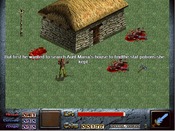Reply to Re: Before...
If you don't have an account, just leave the password field blank.
Okay, so toof.c (see this below variant of your DinkC code), now runs in DinkC; but how do we set, reset and test various bits within a DinkC integer using your code? I must be missing something here.
For example, if we set &status_bd to 12 and pass in the value 8 as the &counter parameter, it would be nice if we got back some indication that the "bit 3 (value 8)" is set in &status_bd. We invoked "external("toof", "binary", 8);". Below are the results we find in DEBUG.TXT.
If we do the same thing for &status_bd (setting it to 12) and invoke "" and then check "bit 3 (value 8)", we get results like those show below which tells us that bit 8 is set, as we would expect.
// This is a variant of toof's DinkC "simple do-while loop" DinkC code:
void binary()
{
int &counter = &arg1;
debug("toof: counter=&counter; status_bd=&status_bd");
int &crap = &status_bd;
// For my tests, I used &status_bd as the global variable.
// Since it is accessible everywhere, it is not passed in.
loop:
if(&counter > 0)
{
&crap / 2;
// I assumed you meant to use the passed in value &counter
// here, not the (apparently undeclared) value &count.
&counter -= 1;
debug("toof: counter=&counter; crap=&crap");
wait(200);
goto loop;
}
else
{
// I found the DinkC modulo math function in
// the "DinkC Reference v4.0" help file! I also
// changed the code to return a value via normal
// DinkC methods instead of the slightly more
// efficient method (but *somewhat* less safe (?)
// if more than one script is calling this code at
// about the same time?) of using a global to
// return the value.
&crap = math_mod(&crap);
return(&crap);
}
}
For example, if we set &status_bd to 12 and pass in the value 8 as the &counter parameter, it would be nice if we got back some indication that the "bit 3 (value 8)" is set in &status_bd. We invoked "external("toof", "binary", 8);". Below are the results we find in DEBUG.TXT.
Dink:toof: counter=8; status_bd=12 Dink:toof: counter=7; crap=6 Dink:toof: counter=6; crap=3 Dink:toof: counter=5; crap=1 Dink:toof: counter=4; crap=0 Dink:toof: counter=3; crap=0 Dink:toof: counter=2; crap=0 Dink:toof: counter=1; crap=0 Dink:toof: counter=0; crap=0
If we do the same thing for &status_bd (setting it to 12) and invoke "" and then check "bit 3 (value 8)", we get results like those show below which tells us that bit 8 is set, as we would expect.
Dink:CHKBIT: do operation(-1) on bd=12(2: status_bd) using which=8) Dink:CHKBIT: do operation(-1) using which=8; wrkbit=1073741824) Dink:CHKBIT: op:-1 --> bs=12; which=8; wrkbit=536870912 Dink:CHKBIT: op:-1 --> bs=12; which=8; wrkbit=268435456 Dink:CHKBIT: op:-1 --> bs=12; which=8; wrkbit=134217728 Dink:CHKBIT: op:-1 --> bs=12; which=8; wrkbit=67108864 Dink:CHKBIT: op:-1 --> bs=12; which=8; wrkbit=33554432 Dink:CHKBIT: op:-1 --> bs=12; which=8; wrkbit=16777216 Dink:CHKBIT: op:-1 --> bs=12; which=8; wrkbit=8388608 Dink:CHKBIT: op:-1 --> bs=12; which=8; wrkbit=4194304 Dink:CHKBIT: op:-1 --> bs=12; which=8; wrkbit=2097152 Dink:CHKBIT: op:-1 --> bs=12; which=8; wrkbit=1048576 Dink:CHKBIT: op:-1 --> bs=12; which=8; wrkbit=524288 Dink:CHKBIT: op:-1 --> bs=12; which=8; wrkbit=262144 Dink:CHKBIT: op:-1 --> bs=12; which=8; wrkbit=131072 Dink:CHKBIT: op:-1 --> bs=12; which=8; wrkbit=65536 Dink:CHKBIT: op:-1 --> bs=12; which=8; wrkbit=32768 Dink:CHKBIT: op:-1 --> bs=12; which=8; wrkbit=16384 Dink:CHKBIT: op:-1 --> bs=12; which=8; wrkbit=8192 Dink:CHKBIT: op:-1 --> bs=12; which=8; wrkbit=4096 Dink:CHKBIT: op:-1 --> bs=12; which=8; wrkbit=2048 Dink:CHKBIT: op:-1 --> bs=12; which=8; wrkbit=1024 Dink:CHKBIT: op:-1 --> bs=12; which=8; wrkbit=512 Dink:CHKBIT: op:-1 --> bs=12; which=8; wrkbit=256 Dink:CHKBIT: op:-1 --> bs=12; which=8; wrkbit=128 Dink:CHKBIT: op:-1 --> bs=12; which=8; wrkbit=64 Dink:CHKBIT: op:-1 --> bs=12; which=8; wrkbit=32 Dink:CHKBIT: op:-1 --> bs=12; which=8; wrkbit=16 Dink:CHKBIT: op:-1 --> bs=12; which=8; wrkbit=8 Dink:CHKBIT: op:query --> bit 8 was found set in 12. Dink:CHKBIT: done











